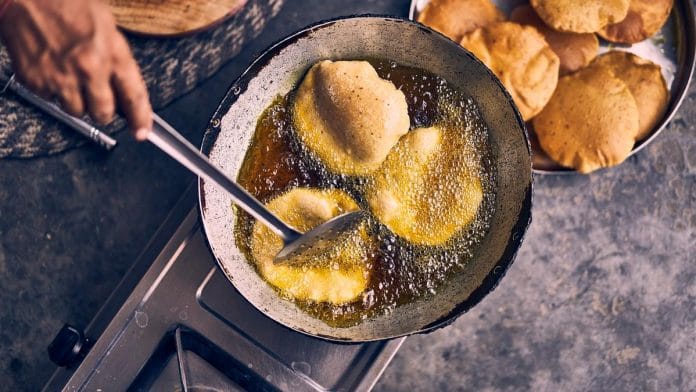New Delhi: A leading edible oil processors’ association and a Rashtriya Swayamsevak Sangh (RSS)-affiliated farmers’ union have spoken up against the central government’s move earlier this month to bring down basic customs duty on refined palm oil until March next year.
The Solvent Extractors’ Association of India (SEA) and the Bharatiya Kisan Sangh (BKS) have both argued separately that the move contradicts the government’s vision of an ‘Atmanirbhar Bharat (self-reliant India)’.
According to these associations, the market price drop will discourage farmers from cultivating oilseeds and also damage oil processing prospects due to the flooding of the market with cheap imported refined palm oil.
The BKU, in a statement released Tuesday, has also demanded that the price of imported edible oil should be maintained above Minimum Support Price (MSP) in order to promote domestic edible oil production.
The government has reduced the basic customs duty on refined palm oil to 12.5 per cent from 17.5 per cent till March next year to boost domestic supplies and bring down rates in domestic retail markets. The government has also decided to allow traders to import refined palm oil without a licence until December 2022.
Also Read: Oil price paradox: Why Modi govt is alarmed by edible oil prices but not petrol & diesel
‘Against the principle of atmanirbharta’
The SEA, the main association of vegetable oil processors in the country, pointed out in a WhatsApp communication to reporters that the reduction in import duty of refined palm oil has not been matched by a simultaneous cut for crude palm oil.
This, they argue, may increase refined palm oil imports at the cost of crude palm oil, which is raw material for Indian refineries.
Atul Chaturvedi, president of SEA, told ThePrint that this went against the principle of atmanirbharta. “This is contrary to our principle of atmanirbharta and may harm employment generation and value addition within India. The only silver lining is that this reduction has a sunset clause with 31 March as the last date,” he said.
The BKS has also said that the duty cut will be detrimental to farmers and to the self-sufficiency of the country.
The move, claims the BKS, will increase dependence on cheap imported oil for domestic consumption while simultaneously leading to a dip in oilseed cultivation and production due to lower price realisation for farmers.
Badri Narayan, general secretary of the BKS, told ThePrint that the government should instead try to “discourage” imports of refined palm oil.
“The landing price of the imported commodities should not be lower than the MSP declared for it. In fact, import duty should be raised to a maximum extent in order to discourage imports. Crude rather than refined oil should be allowed for imports, if necessary,” Narayan said.
He added that the government should look at alternative ways to control the market price of edible oil.
“In order to keep market prices of edible oil on the lower side, the government should provide oilseed farmers grant money as an incentive, in accordance with the crop acreage. Also, below poverty line families should be provided with cash handouts against their average consumption,” he said.
Move will encourage blending of oils, says BKS
The BKS has pointed out that India primarily imports palm oil from major producers such as Malaysia and Indonesia at a cheap rate. This low-priced oil, claimed the union, is often heavily mixed with other oils in order to maximise profits, aided by relaxed blending norms in the country.
The farm union has said that the ban on mustard oil blending earlier this year has already led to better price realisation for farmers as well as increased crop acreage. Similar bans on blending other edible oils should be enforced, the BKS said, adding that the government should promote procurement of pulses and oilseed rather than focusing mainly on wheat and rice.
The BKS claimed that such a measure will improve agricultural diversity, and make the country not only self-sufficient but a net exporter of oilseed and pulses.
(Edited by Asavari Singh)
Also Read: Festive season sees drop in pulses prices from June peak: How Modi govt made that happen






